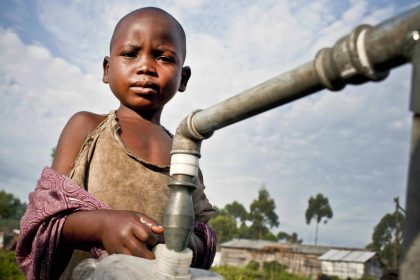
Helping Boys Grow Into Well-Rounded Men Despite Poverty
Tokunbo Ifaturoti
Introduction
A group that often goes dangerously unnoticed within much of Nigeria’s patriarchal society is that of young boys living in poverty. The boys face many of the same struggles as everyone else around them but are often ignored with the thought that they are “tough”, “naturally able to cope” and already living with the benefit of being “preferred” over their female counterparts.
These boys are often left on their own to decipher what it means to be a mature and responsible man through the haze of poverty. Few solutions are put in place to ensure that they grow into well-rounded men who are ready to take on the responsibilities of adulthood and contribute positively to the upliftment of their families and communities.
Lessons From Sports
One proven way to address this issue is through sports. Sports can play an active role in the transformation of boys to men. Additionally, to a great extent, it requires less financial input than many other initiatives. Football, often considered Nigeria’s national sport, is a prime example of how sports can make a change.
All that it takes are a ball, an open field and a coach prepared to work with the limited resources the community has. Willing and capable coaches and mentors play an indispensible role in and are a major benefit to many impoverished communities. The coaches guide boys in these communities in the display of acceptable and respectful behaviour while passing on valuable life-lessons.
Social lessons and skills learnt through playing football include (but are certainly not limited to) the following:
- Handling Conflicts – When conflicts arise, boys on the field take the matter to whoever is in charge, be it the referee, coach or team captain. Football teaches them to solve their problems without violence. They respectfully plead their case and accept the decision of the authority figure.
- Self-confidence – A sense of pride comes from contributing to the success (or good performance) of a team. Boys feel a growing sense of self-worth in that their input made a difference in the team’s overall accomplishments. This confidence in their abilities makes it easier for them to seek out new prospects off the field and to take advantage of opportunities as they arise.
- Perseverance – Defeat and set backs are part and parcel of the game, so too are analysis of failure and strategizing for making another attempt. Boys learn that life is not all about winning but about learning from our mistakes and having the diligence to keep tackling the challenges life brings.
- Individual Contribution – By playing football, boys learn that each member of the team plays a role in its overall performance. Scoring a goal is as important, as setting one up or foiling an attack from the opposite side. They transfer this lesson to their families where they begin to see the value of both males and females, young and old to the advancement of family.
Conclusion
These lessons are profound and are taught in an informal and supportive manner. The beauty of it all, is that the things the boys learn are naturally and subtly transferred into the homes and communities from which they come. This makes football and sports in general, a vital tool not just to distract boys from their condition of poverty, but to instill positive traits needed in adulthood.
.


